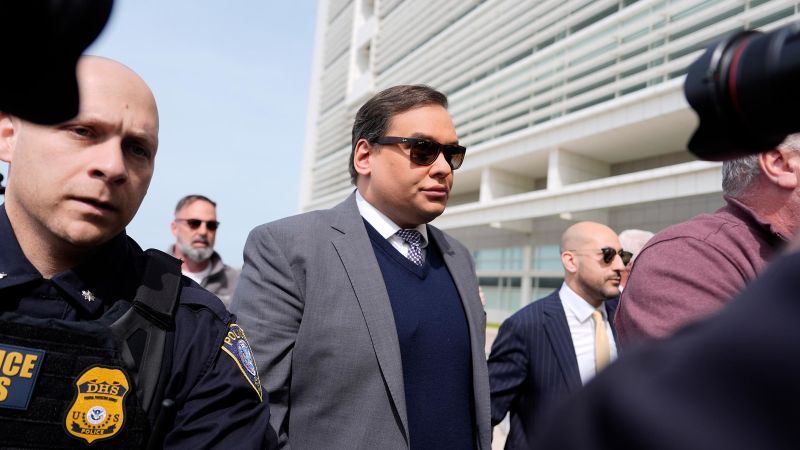On a significant day marking legal consequences for a controversial political figure, disgraced former Representative George Santos was sentenced on Friday to an extensive prison term of 87 months. This sentence ensued from serious charges related to aggravated identity theft and wire fraud. The offenses were associated with fraudulent activities that took place during his 2022 midterm campaign. In a typical courtroom atmosphere, the gravity of Santos’s actions resonated notably as he faced the judicial repercussions of his misdeeds.
The short window before Santos must report to prison was set by Judge Joanna Seybert, who ordered him to surrender by July 25. This timetable emphasizes the court’s urgency in addressing the misconduct that Santos displayed, shedding light on the necessity for accountability and deterrence in political conduct.
Expressing his emotional distress and the impact of his actions, Santos sobbed during his brief statement in court, admitting to have “betrayed the confidence entrusted in me.” He conveyed a sense of regret while affirming his intention to navigate the future more responsibly, declaring, “I cannot rewrite the past, but I can control the road ahead, I have tried my best.” Such statements, however, come in the wake of the significant damage done to constituents and trust in government institutions.
Comments from officials outside the courtroom highlighted the severe implications of Santos’s fraud. Roberta Reardon, the New York State Department of Labor Commissioner, criticized Santos for his exploitation of unemployment benefits during the COVID-19 pandemic, claiming that he exhibited a “callous disregard for New Yorkers.” This sentiment echoes a widely held concern regarding the non-victimless nature of his crimes. With numerous families suffering during the economic fallout of the pandemic, Santos’s fraudulent actions are seen as particularly egregious.
The court proceedings revealed the depth of public dissatisfaction and outrage against Santos, as Judge Seybert mentioned receiving a letter from a constituent in his former district expressing indignation about his fraud. His defense, however, portrayed Santos as a product of his environment, emphasizing his identity as a 36-year-old gay man from a challenging background. They argued for a more lenient, two-year sentence based on these factors, yet the prosecution maintained that the gravity of his actions warranted the maximum sentence, asserting that he had stolen identities and misappropriated funds for luxuries, indicating a blatant disregard for the law.
Assistant US Attorney Ryan Harris, in his arguments, asserted the severity of Santos’s deceit, stating, “He rose to one of the highest offices in the land on a wave of lies.” This reflection on Santos’s ascent to Congress rings true as it emphasizes the dangers posed when individuals prioritize personal gain over ethical governance.
Despite making money through social media—and participating in podcasts and documentaries—it struck Judge Seybert as incredible that Santos had not taken steps to repay the victims of his fraud, opting instead to remain entrenched in his narrative of lies. The light-hearted aspiration he once had to serve in Congress has now devolved into a cautionary tale that exemplifies the darker side of political ambition.
The harsh realities of Santos’s situation include being expelled from the House following a report by the House Ethics Committee citing instances of “uncharged and unlawful conduct.” The expulsion encapsulated months of public scrutiny that led not only to his legal troubles but also significantly marred his public image. Faced with allegations that he misused campaign funds, submitted false financial disclosures, and committed significant fraud related to Covid-19 benefits, Santos represented an alarming divergence from the ethical expectations placed on public officials.
Even his previous attempts to maintain a political future were hampered; his brief bid to run as an independent in another New York district resulted in his campaign stalling after only a month. As the nation moved toward the inevitable conclusion of his legal battles, Santos eventually made the decision to plead guilty just weeks before his scheduled federal trial.
With the completion of this chapter calls for reflection not only on George Santos’s actions but also on the systems in place intended to ensure transparency and integrity in public service. As the story evolves, the hope remains that lessons learned will cultivate a stronger ethical foundation for those aspiring to hold public office in the future.



